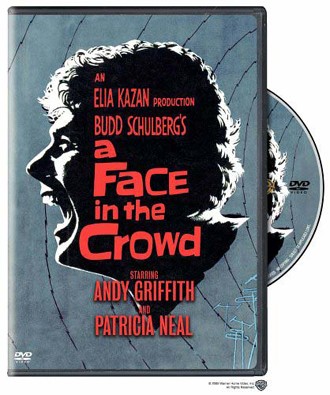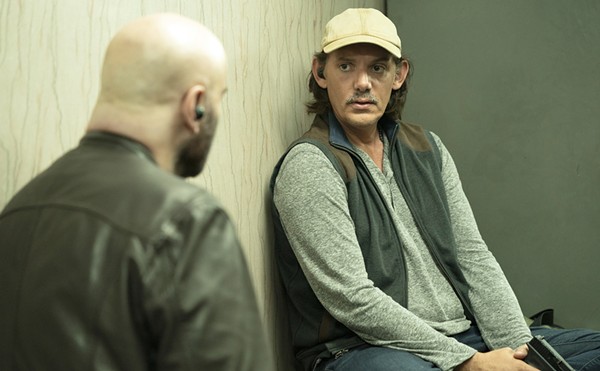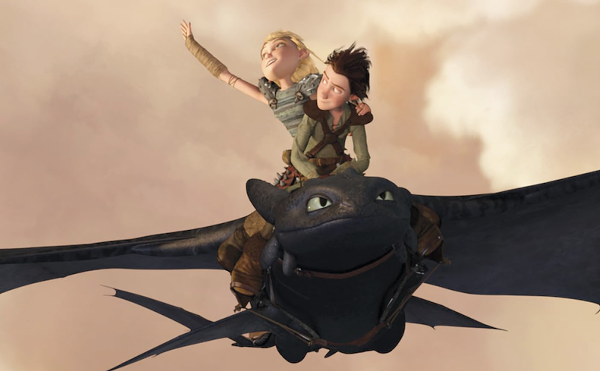| |
Certain novels are so reliant on extravagant language and structure or mind-bending imagery that they're thought to be unfilmable. Last year, the Criterion Collection reissued one famous example, Fear and Loathing in Las Vegas, and now they have given us another: David Cronenberg's interpretation of William S. Burroughs' Naked Lunch, which does as well by its source material as it can possibly be expected to do.
Residing somewhere between comedy, horror, and beatnik sci-fi travelogue, the film builds its own plot out of the book's imagery, one in which writer and part-time exterminator Bill Lee (the gloriously out-of-it Peter Weller) descends into a world of secret agents, roach-like talking typewriters, and icky aliens that looks a bit like Tangiers but is more likely a hallucinogenic metaphor for Lee's drug addiction. As with much Cronenberg, sexual orifices and effusions show up in the darnedest places, but they never come across as seriously here as they do in some of his other films; not entirely committed to its invented story, Naked Lunch isn't a complete success, but it's weird in all the right ways.
More recent movie adaptations have had their own troubles: Steven Soderbergh's Solaris (Fox) tanked at the box office, despite its soulful and intelligent approach to Stanislaw Lem's novel. The studio's marketing department just couldn't figure out how to sell the unique film, which has a love story, ghosts, and spaceships, but refuses to do predictable things with any of them. Ang Lee's The Hulk (Universal), on the other hand, had enough marketing might to match its star, but proved too brooding for the popcorn-munchers and too silly for the highbrows (if only Lee could have chopped the outlandish finale in which Hulk's dad becomes a super-villain).
Until CGI came around, animation was a good solution to the "unfilmable" dilemma. Alice In Wonderland (Disney) tames Lewis Carroll's twisted fairy tales in all the expected Disneyish ways but still contains plenty to fire the imagination. Disney's old DVD has been out of print for a while, but a new one arrives on January 27, complete with a Mickey Mouse short and a "newly discovered" musical sequence featuring the Cheshire Cat.
| Naked Lunch (Criterion Collection) Solaris (Fox) The Hulk (Universal) Alice In Wonderland (Disney) The Great Gatsby, The Last Tycoon, Hud (Paramount) Heat and Dust, Bombay Talkie (Merchant Ivory Collection) |
Hollywood has had much better luck with Larry McMurtry. Martin Ritt's adaptation of Hud (Paramount), set in dusty Texas ranch land, never hits a false note. Paul Newman plays the title character, an egocentric womanizer who is putting in time on his father's ranch only until he can usurp control of the land and sell oil leases on it. Shot in beautiful black-and-white by the legendary James Wong Howe (who earned an Academy Award for the film), the picture is a perfect complement for McMurtry's spare, convincingly real dialogue. The story plants Hud between his righteous father and his orphaned nephew, who envies his uncle's cool without completely accepting his morals, and Newman's performance is captivatingly amoral.
A novelist who really cares about the dialogue's transition from page to screen, of course, must envy screenwriter Ruth Prawer Jhabvala, whose decades-long partnership with James Ivory and Ismail Merchant ensures that those on the set display an exceptional degree of respect for every comma and dash in the screenplay. Heat and Dust, one of two new releases from the "Merchant Ivory Collection," (produced by Criterion and Home Vision) has Jhabvala adapting her own novel, while Bombay Talkie is a testament to the exotic cinema of India, where Jhabvala began her writing career. Jhabvala has gone on to adapt everyone from E.M. Forster to Diane Johnson; William S. Burroughs may be something of a stretch, but maybe the time is right for her to try her hand at Fitzgerald. •















